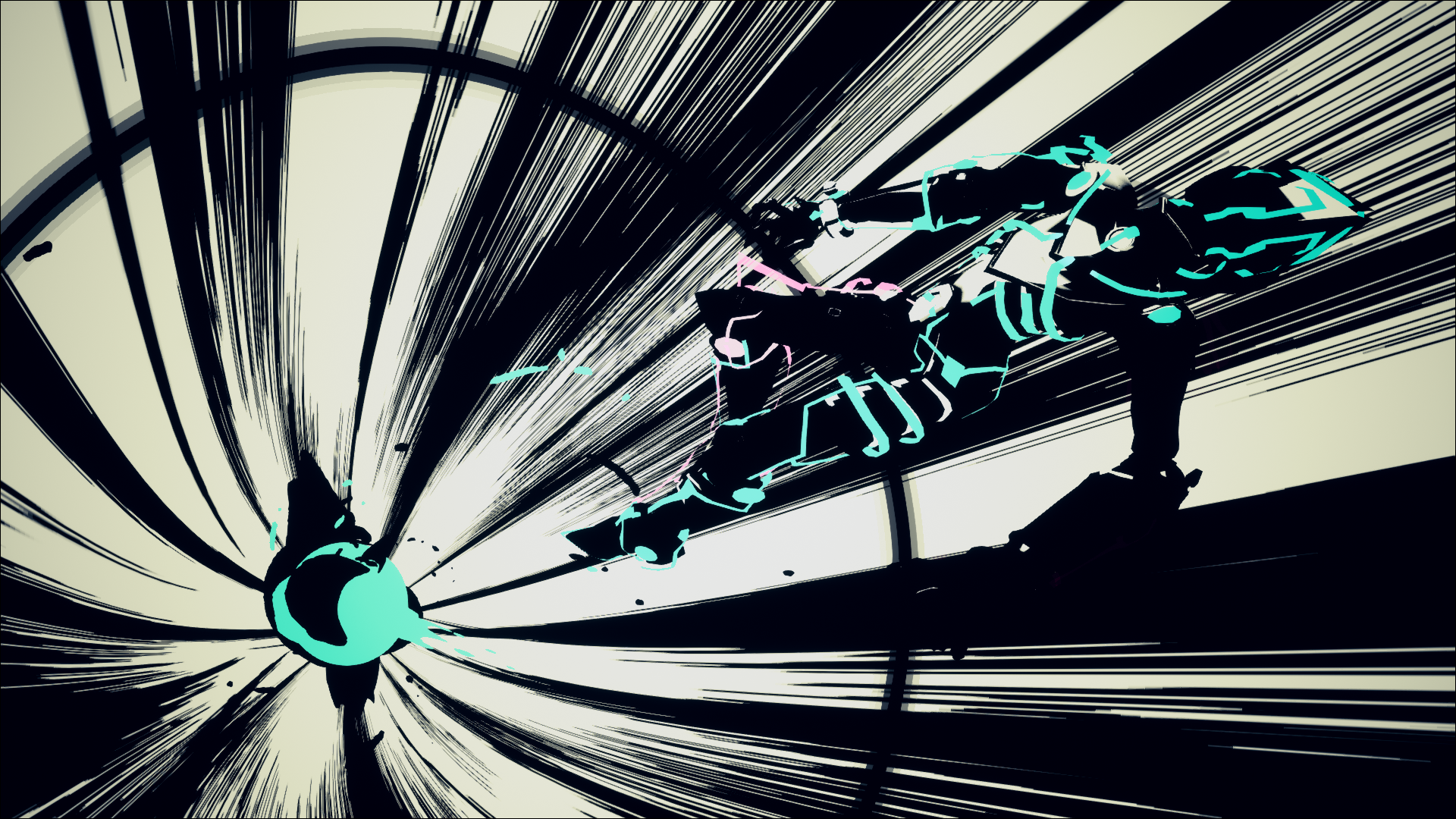Our Verdict
Despite its strengths, Solar Ash fails to skate free from the gravity of its influences.
PC Gamer's got your back
What is it? An action adventure skating hybrid
Expect to pay $40/£32
Developer Heart Machine
Publisher Annapurna Interactive
Reviewed on GTX 970, i7-4790K, 16GB RAM
Multiplayer? No
Link Official site
Style and substance feel opposed in Solar Ash, developer Heart Machine's follow up to debut Hyper Light Drifter. It has an abundance of the former but a vacuum where the latter should be. Visual novelty and slickness keep it skating along, but it never manages to fill that void—no matter how many outlandish set pieces, stylish transitions and beautiful landscapes it throws in its path.
You play as Rei, a voidrunner who plunges herself into a blackhole to activate a macguffin—the Starseed—which we're told can save her planet, currently caught in the singularity's grasp. Inside this black hole is a dreamlike landscape rendered in soft clouds and goopy surfaces, all of it in bold colours. The ultravoid. It's delightfully tactile, Rei landing in candy floss-like hills and pulling sticky mass behind her as she jumps. Even the collectibles, plasma, are rendered as blobs of liquid. The world feels ephemeral, doomed to be washed away. It's a palpable mood, enhanced by sheer scale and verticality, a world of massive planetoids suspended in space, clinging to each other via clouds or thin rails.
If the world feels 'wet' then so too does movement, with inertia carrying you through slips and slides as you skate. Chain the skates with rail grinds and eventually you can build some serious momentum. Picking up speed to throw yourself over the crest of a hill or round a corner, lashing out at enemies on the go, lets the game come alive. In those moments Solar Ash captures a roller coaster energy, letting you barrel across alien landscapes with confidence. Anyone who's done any skating in real life, especially on ice, will appreciate how much it captures that particular exhilaration, even if it's far more easily earned.
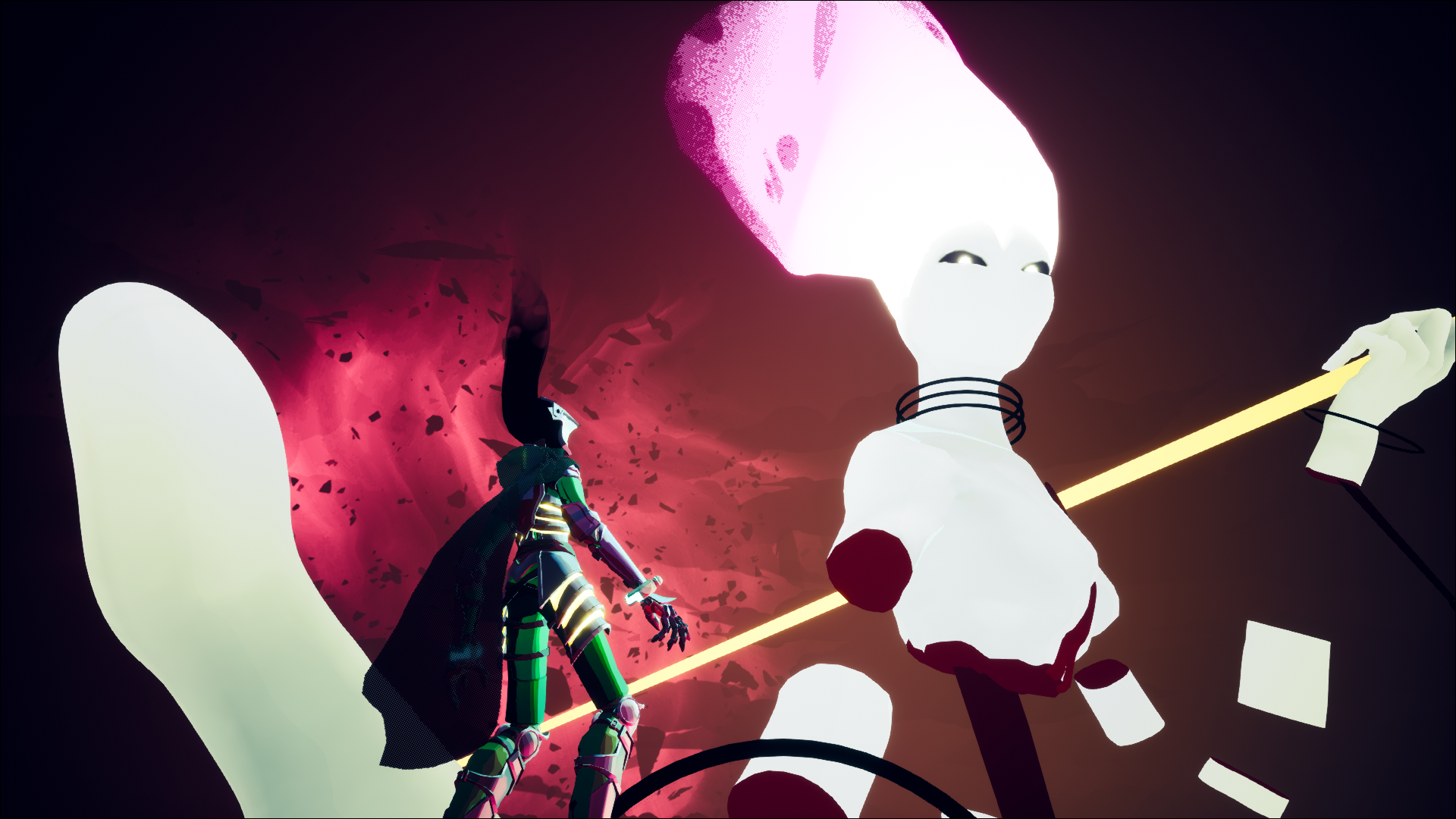
New areas slowly get bigger and more open, so as your skill grows so do the playgrounds available to you. Personal favourites include an area of floating shipwrecks and a spooky fungal biome where rails can be summoned with spores. Not every area feels as fleshed out, but those that have that extra novelty to them kept a smile on my face.
Wonderful as moving through the world is though, what you're tasked with doing is much duller. Each area follows the exact same structure: Find and destroy a few obstacles in each area to summon the boss, then attack the bosses telegraphed weak points so you can hit it in the eye. Do that three times then onto the next area to do it all over again—with no variation.
Disasterpeace returns to score the soundtrack, but seems to have far less room to move than the player—chained to boss fights and broad ambient soundscapes. There are practically none of the curious little scenes that filled Hyper Light Drifter and allowed the music to fill the gaps in the story with moody anguish and grief. In Solar Ash, the music is a pleasant accompaniment and definitely establishes a strong atmosphere yet is robbed, much like the visuals, of a chance to evoke anything of weight.
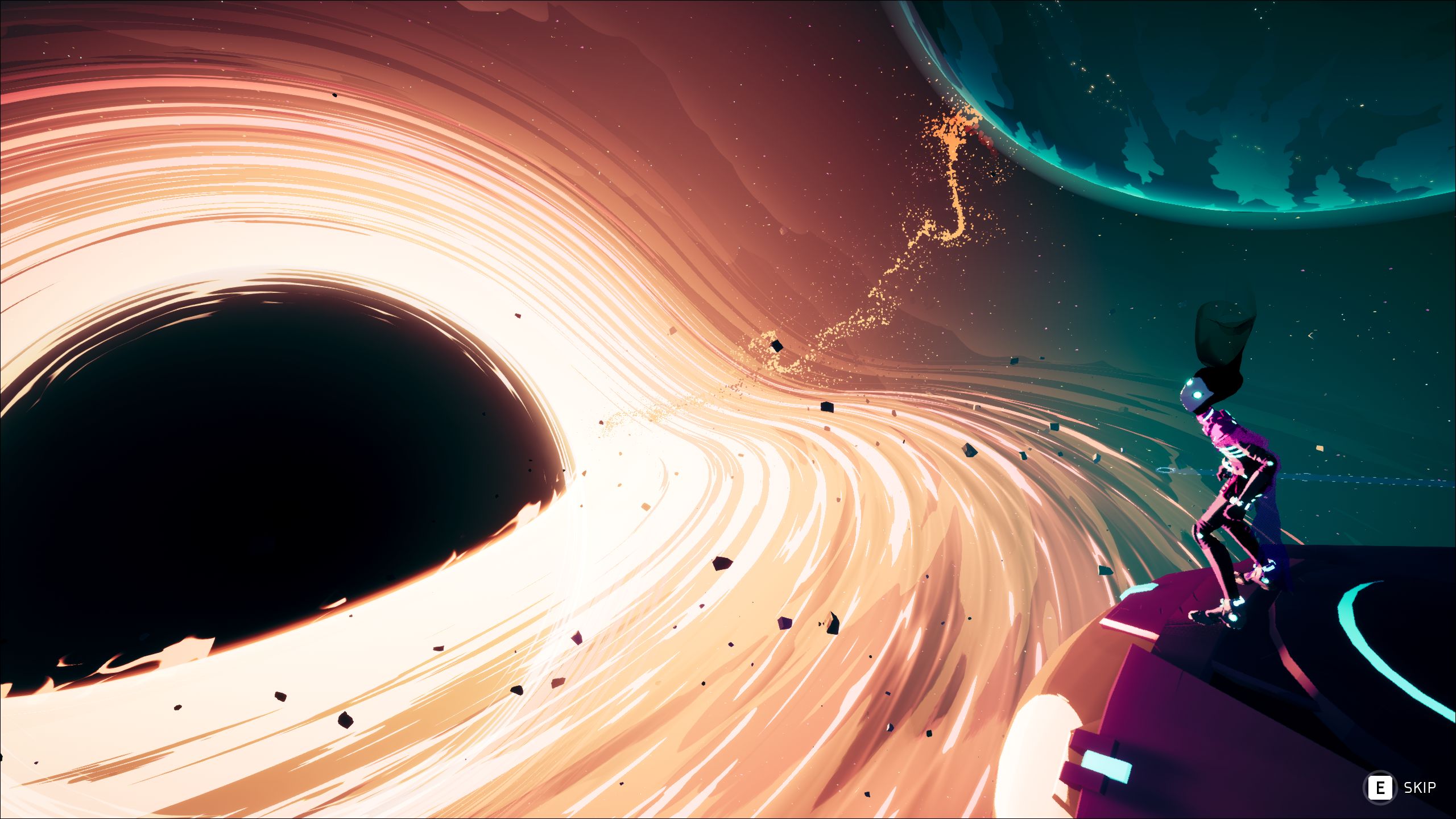
Coming from Hyper Light Drifter I expected a setting equally absorbing. Instead Solar Ash's story is like navigating its world sometimes; full of dead ends. My biggest problem with the game stems from the addition of voice acting. There's a message at the start designed to convey the premise—which felt clumsy, but I was willing to roll with it on the assumption this was just a little kick to get us started. However, right from the moment it begins the characters won't stop talking, stop explaining. Every new vista or item found has Rei deliver an explanation before you can even ask the question. As soon as a city enters my view Rei has already identified the architecture and spoken about its creators.
Solar Ash's story is like navigating its world sometimes; full of dead ends
It deprives the game of the blank spaces necessary to get me speculating. Hyper Light Drifter excelled at this. Even now I couldn't strictly tell you what the exact plot of that game was. I can tell you what I felt and imagined as I explored, how poignant the melancholy was in a protagonist struggling to fight for their world in the face of a fatal illness. Solar Ash has none of that. It has characters chatting, its world is littered with lengthy audio logs and the story is so dreadfully straightforward I imagine most will see its singular twist coming from the start, making the eventual reveal feel a little tiresome. I do smile at Rei’s little chuckles on pulling off a successful trick, so there are definitely some gains from the inclusion of voice acting.
Dialogue doesn't have to be antithetical to evocative storytelling. It's possible to enhance a world's mysteries with the right words, having characters imply meaning or depths that we ourselves might not glean from visuals alone. The dialogue of Solar Ash just isn't very good. It's all expository or functional, with the character archetypes so broad they're left paper thin.
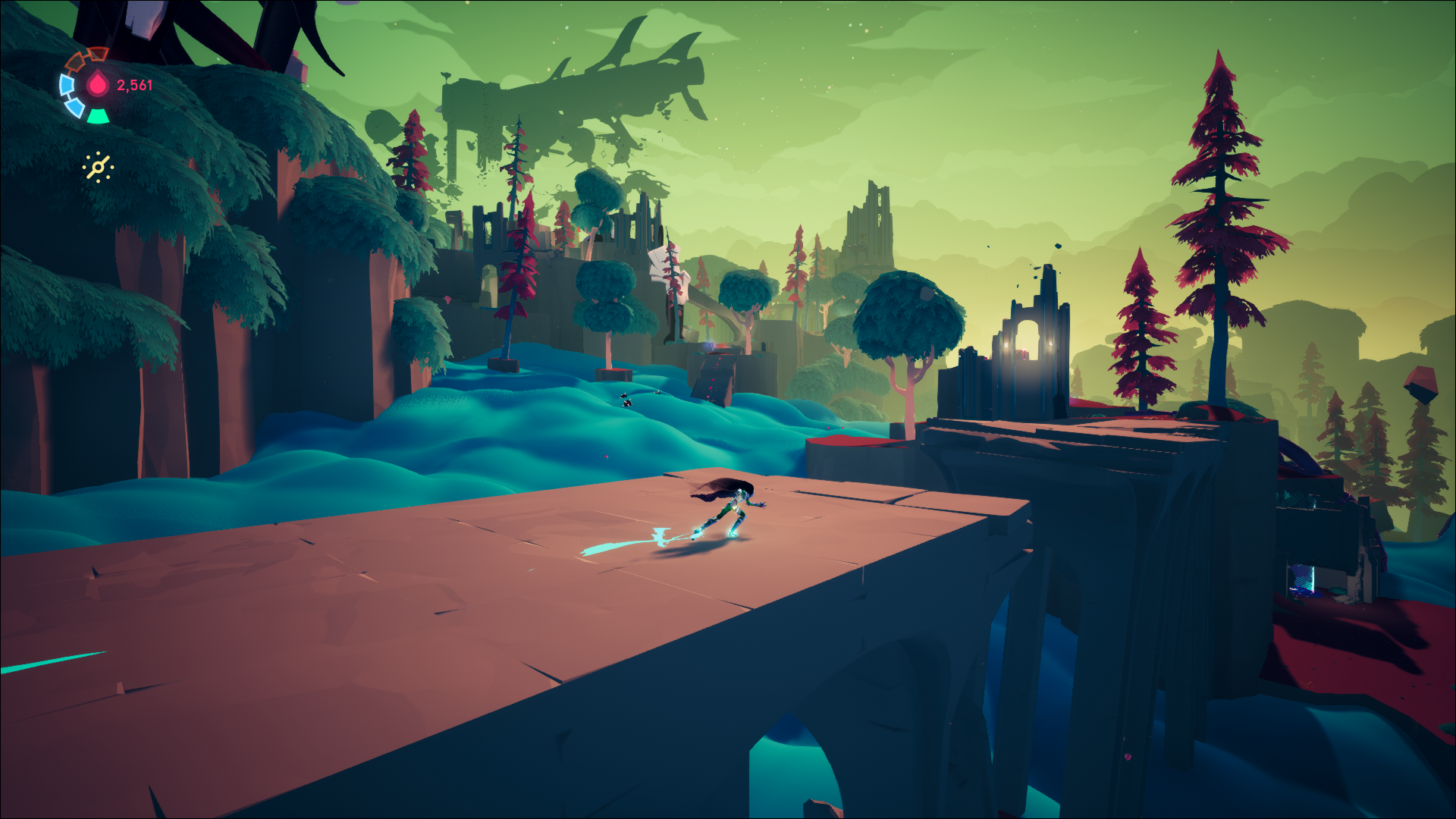
Visually it's so rich and its imagery sometimes truly striking, that it feels a waste to slap explanations on it all. The giant figure who tries to crush Rei throughout could be mysterious. A malevolent entity or uncaring god? Instead, thanks to the dialogue, we know exactly who they are and what they want. Several encounters that circle the same threadbare plot assure us of that. Our plucky heroine is so by the numbers too. There's a small complication that enters the mix due to the aforementioned twist but it only does a little to elevate Rei as a character. Why doesn't she tell us about home? Give us an impression of what she's fighting for?
Hack 'n' Skate
Speaking of fighting, combat is certainly an oddity. Despite the simplicity, it's terribly unforgiving in the early portion of the game. One or two hits will see you sent back to a checkpoint and with the slippery movement it's hard to avoid incoming attacks. Things don't so much become easier, rather, the game flops between lengthy segments that are a total breeze and others that are a borderline nightmare. That doesn't stop it being satisfying when it works. Sliding through a room, striking enemies as you zip past is really cool, and the game does reward you when you can rise to its expectations. When it comes to its skating, Solar Ash manages to stay exhilarating enough to make it worth the price of admission on its own.
It reminded me of The Pathless, which feels like a close brethren. Both strong in art style while pursuing a profound sense of motion. Solar Ash falls behind by failing to find harmony between its means of navigation, with anything but skating feeling like a halt. In The Pathless, flight, sprinting and sliding all chain together until it's possible to bound across the map for miles. Both games have a repetitive structure, yet Solar Ash's feels far more pronounced, thanks to samey bosses and simpler, less varied puzzles. The Pathless wisely saved combat solely for its boss fights, a lesson Solar Ash should've learned from some of its other influences.
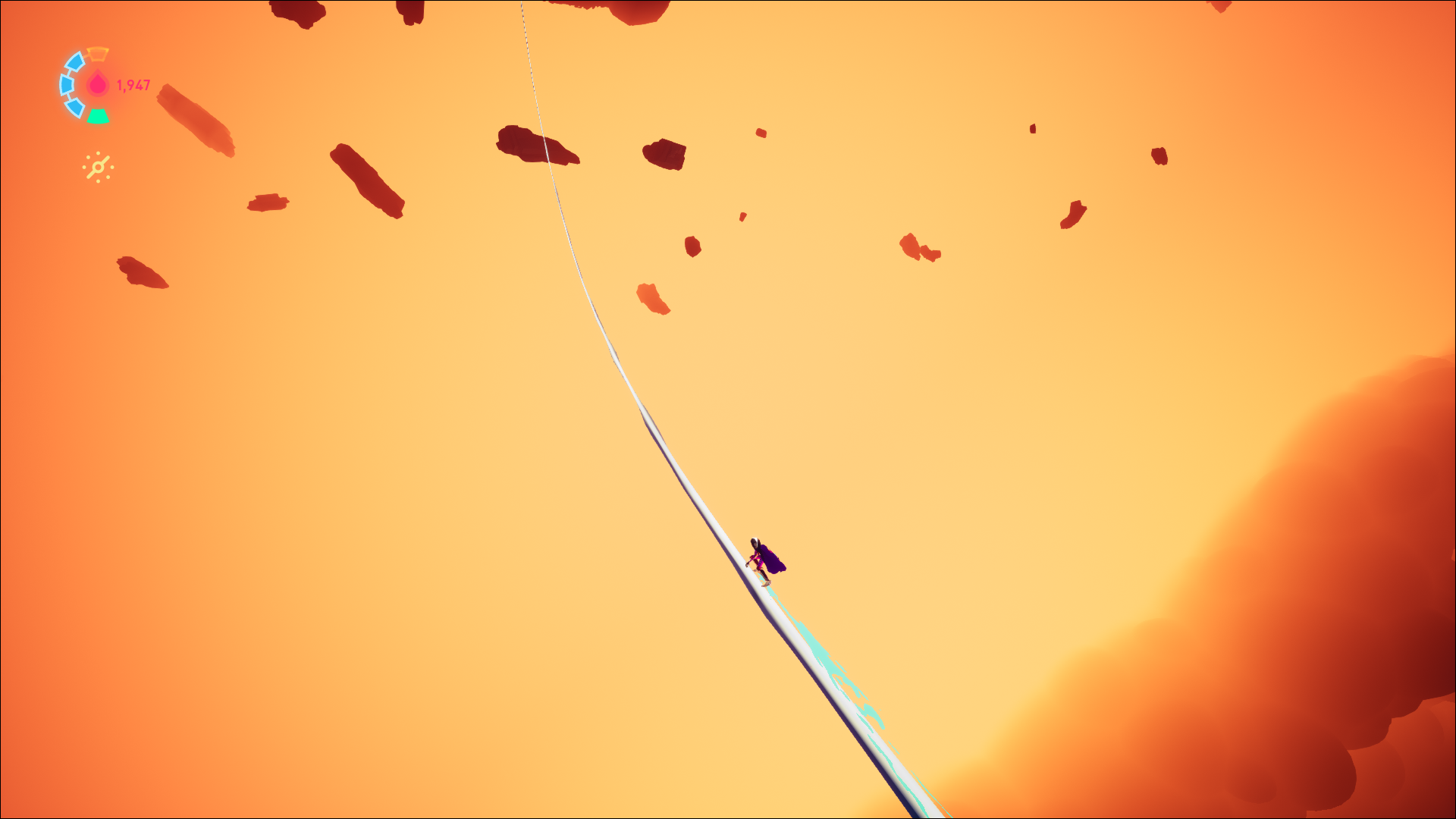
Its bosses are a bit of a let down. For sheer spectacle, they're impressive. Truly massive giants that become entire islands unto themselves. Avoiding their attempts to squish you by weaving in and out of scenery is one of the game’s finest moments. Once you get on their body though, they're indistinguishable from the obstacles you had to overcome to reach them, racing down their backs to hit various weak-points until you're permitted to stab them in the eye. Having to do it three times, every time, feels like a wild over-estimation of how much these fights have to offer.
That they so blatantly evoke Shadow of the Colossus only hurt it further, illuminating the absence of a real struggle with little to no back and forth between you and your foes. Team Ico's classic nailed down the David and Goliath feel, by making you feel tiny and helpless sure, but also by permitting failure. You could fall over, take a tumble and still climb back up. A single misstep in Solar Ash gets you punted to the nearest save point so you can start the sequence over again. By turning bosses into these obstacle courses, they're reduced to artifice. I never felt like I was in a deadly duel with a gargantuan foe. I felt like I was having a go on a novelty skate park, animatronic limbs flailing around while sound effects complimented my sick tricks. Which is still pretty enjoyable in its own right thanks to how well the game nails the feel of skating.
That’s the thing: it's never bad. In fact, it's a fun time all in all, and the skating is sublime. I just never, ever shook the feeling that something weightier or substantial was missing. Hyper Light Drifter haunts me like a broken memory, leaving me to try and piece it back together even years later. This is a half remembered dream already. A pleasant dream, but fast fading. My kingdom for the game Solar Ash could have been.
Despite its strengths, Solar Ash fails to skate free from the gravity of its influences.
